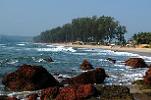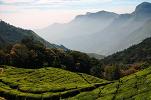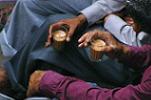|
Experience India Through Its Colourful Festivals
January
Bikaner Camel Fair Early January, weekend Taking place in Bikaner in Northern Rajasthan, this festival celebrates anything 'camel'. A camel procession begins the festivities, and is followed by camel races, competitions, dancing and decoration. This is combined with traditional music and dance, stalls, a spectacular fire dance and fireworks all with the stunning backdrop of Bikaner's Junagarh Fort.

FebruaryDesert Festival Late Jan. / early February One of a few Indian festivals organised by the tourist authorities to attract visitors, this fete brings thousands of tourists every year to the desert city of Jaisalmer. The fair is a showcase of traditional Rajasthani music, dance, costume and lifestyle, with other attractions including camel races, puppeteers, snake charmers and the competition for the coveted title of, 'Mr. Desert.'
Shivratri February / March Shivratri or 'Great Night of Shiva' celebrates the Hindu deity Shiva. For many Hindus a fast is observed as well as frequent offerings. The festival recognises the union of Shiva and Parvarti and is also regarded as the night Shiva performed 'Tandava,' his great dance of creation and destruction. Celebrations occur all over the country and include singing, chanting, processions, libations and a night long vigil. March / April
Elephant Festival Time of Holi festival Held in Jaipur, this popular festival centres around the elephant, a much loved animal in India. Since it is at the time of Holi, the elephants are often elaborately decorated with paints, as well as garlands of flowers and fine fabrics. Also to be seen are elephant races, processions and polo games.

MayBuddha Purnima / Vesak Usually early May The most important day of the Buddhist calendar, this India festival marks the birth, enlightenment and death of the Lord Buddha. Vesak is celebrated all over the Buddhist world, and involves meditation, giving to charity, enjoying vegetarian food and giving offerings of insence, flowers and candles. Visiting Bodh Gaya in Bihir, India at this time is particularly auspicious since it is here that Buddha achieved enlightenment. June
Rathyatra Late June Held in Puri, Orissa, this Indian festival occurs over eight days and is attended by millions of Hindu devotees of Lord Jagannatha, a form of Krishna. Three decorated chariots of about 45 feet in height are pulled through the streets of Puri by devotees eager to be a part of the proceedings and catch a glimpse of the deity in his chariot. July
Champakulam Boat Race Usually early July The quiet village of Champakulam in the Keralan backwaters attracts thousands of visitors every year by hosting India's most popular vallam kali, or snake boat race. Before the racing of the 100 foot long boats, there is a procession of water floats and beautifully decorated boats, as well as singing from the oarsmen. August / September
Independence Day 15th August A public holiday marks the day that India achieved independence from British rule in 1947. Flags decorate the streets and ceremonies take place in schools across the country. India's struggle towards independence claimed many lives over many years, and marking this day commemorates those who sacrificed their lives for the dream of an independent India.
Onam Festival August or September Onam festival is celebrated most passionately in Kerala and takes place over ten days. It is a thanksgiving festival for the harvest, and some of the activities include showings of Indian dance, music, making Pookalam (flowers laid on the ground in intricate patterns), a carnival and a large shared lunch. There are also elephant processions, snake boat races and parades. Onam festival celebrates the rich culture of Kerala, the beauty of its traditions and the passion of its people.

October / NovemberDiwali Festival October or November One of the most important Indian festivals, Diwali festival / Divali represents the Hindu new year. It is alternatively known as the festival of light, and is celebrated by lighting lamps and candles, and by firework displays and gift giving. At the time of Diwali festival India's Hindus commemorate the return of Lord Rama from fourteen years of exhile, and also celebrate three goddesses, Lakshmi, Kali and Saraswati. Spiritually, this Indian festival recognises the 'awareness of the inner light,' a concept central to Hindu belief.
International Film Festival of India November In its 40th year the 'Cannes of the East' is held in Goa and showcases film from India and around the world. Awards are presented over various categories, and alongside the showings workshops are held and events organised. December
Christmas 25th December There are more than 2 million Christians in India, and at this time miniature nativity scenes are displayed in their houses, banana or mango trees are decorated with lights, carols are sung and mass is attended. Being a nation that loves to celebrate, Indian people of other religions embrace the festival and observe traditions, albeit with an Indian twist, as when Christmas Baba delivers presents from a horse and cart. Goa is a popular destination at this time and people crowd to the beaches in Goa to dance, eat and enjoy the occasion. Experiencing Indian festivals is one of the best ways to appreciate the enthusiasm and enjoyment with which Indian people celebrate their culture. Click to find more information about Indian festivals of Goa and the Kerala festivals.
Click here to leave Indian Festivals to Travel India Goa Guide Home
Indian Religion -
India Facts -
Indian Weather -
Visa For India -
Goa Guide -
Getting Around India
|
|
Picture galleries on this siteSome of our favourite travel pictures of Goa. Find many more Goa pictures in our Goa guide. The stunning landscapes of Kerala. Find many more Kerala pictures on our travel to Kerala guide. Some pictures of India to inspire adventurous travellers... |






